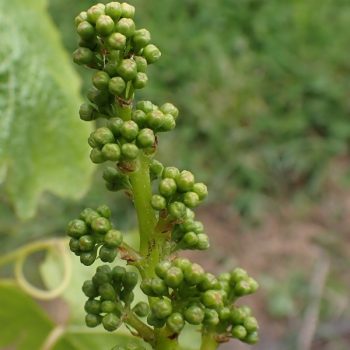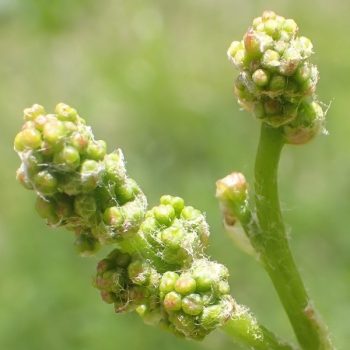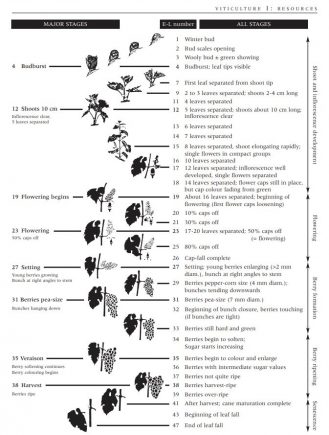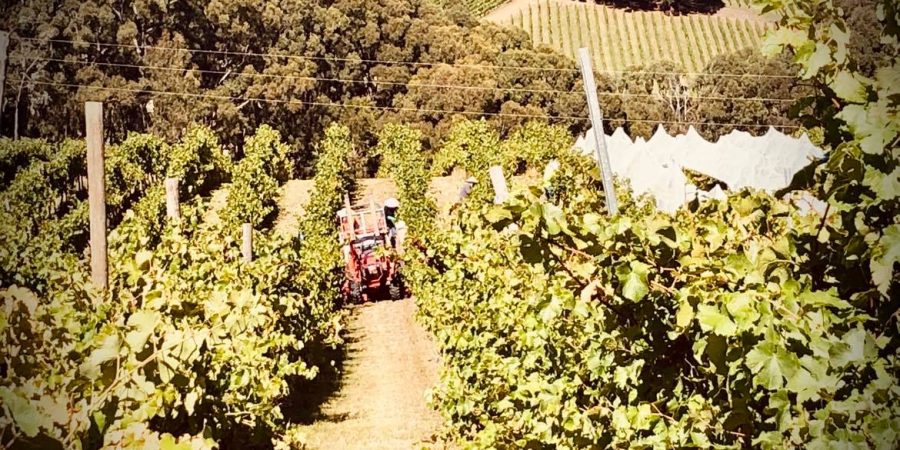As we head into another growing season, I need to revisit this topic so we’re all on the same page.
I know I’ve repeated myself several times (the first time I introduced this topic was back in 2018!!), but this concept sets the scene for the entire growing season.
If you’d prefer to skip this one, be my guest. But if you’re new here (or need a refresher)… welcome! And enjoy this blog post!
First things first though – let’s have a look at last week’s CropWatch report (18th October) to see what the vines are currently doing here in the Hills…
Most Advanced
E-L 17 12 leaves separated, shoot elongating rapidly, single flowers in compact groups.
Macclesfield Chardonnay

Least Advanced
E-L 14 7 leaves separated.
Lenswood Sauvignon Blanc, Kuitpo Shiraz

The annual growth cycle of the grapevine
As with all perennial plants, the grapevine follows an annual growth cycle which has eight major stages.
A “perennial” plant is one that grows or blooms over the spring and summer, dies back during the autumn and winter months, and then repeats the cycle from its rootstock the following spring.
1. Budburst (E-L stage 4)
(E-L stage?? What the heck? Don’t worry, I’ll come back to this later)
In Spring (around September/October), the first signs of life occur as the buds begin to break. At this stage, the vines are very susceptible to frosts. Vineyard managers are keeping a VERY close eye on the weather right now. While there are currently no long term predictions of frost (thanks El Niño), it always pays to have your frost protection ready at this time of year.
2. Shoots 10cm (E-L stage 12)
The bunches are clearly visible at this point. There are five leaves that are visible and open.
3. Flowering begins (E-L stage 19)
The flowers of grapevines are called “perfect flowers”. This means they have both male and female parts and they are able to pollinate themselves without the need for bees.
4. Flowering (E-L stage 23)
This is the stage at which 50% of “caps” fall off exposing the reproductive organs of the flower.
(The “cap” encloses the reproductive organs and other tissues within the flower)
5. Setting (E-L stage 27)
Cap fall is complete and the young berries begin to grow.
6. Berries pea-size (E-L stage 31)
The young berries are now around 7 mm in diameter or about the size of a pea.
7. Veraison (E-L stage 35)
This is when the berries begin to enlarge and change colour. At this stage, the berries are getting sweeter and softer.
8. Harvest (E-L stage 38)
The berries are ripe and ready to harvest!
What is an E-L stage?
 In the science world, we like systems and classifications (well, at least I do!). And it turns out two blokes named Eichhorn and Lorenz did too. So much so that they came up with the first classification of stages for grapevine development (or phenology) in 1977. It has been modified a few times since then but is now commonly referred to as the Modified Eichhorn-Lorenz (E-L) system.
In the science world, we like systems and classifications (well, at least I do!). And it turns out two blokes named Eichhorn and Lorenz did too. So much so that they came up with the first classification of stages for grapevine development (or phenology) in 1977. It has been modified a few times since then but is now commonly referred to as the Modified Eichhorn-Lorenz (E-L) system.
The diagram on the left is the official chart. You can see that the eight major stages are preceded by a number of other stages numbered from 1 to 47.
This chart should make those words from the crop watch report up there make a lot more sense.
So (remembering this news is almost a week old now), the least advanced vines in the Hills were at growth stage E-L 14. This means that there are 7 separated leaves visible.
And the most advanced vines were at growth stage E- L 17. Which according to the chart means – 12 leaves separated, shoot elongating rapidly, single flowers in compact groups. Those little flowers will all (if they’re not diseased or damaged throughout the season) become berries. Which Rob and other winemakers will turn into wine!
Good, now that we’re all up to speed you’ll all know what I’m talking about when I give you regular season updates! No excuses!
